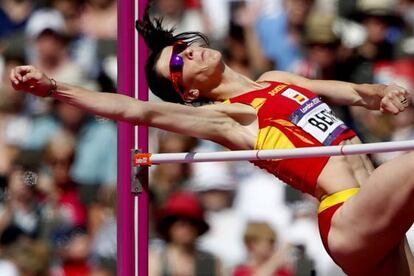"Better than we expected"
Spain's poor Olympic track & field showing was offset by unexpected successes

Spanish athletics entered the Olympic Stadium in Stratford stumbling and left it limping. The first competitor was Ángel Mullera, who competed against the Spanish federation's wishes in the 3,000m steeplechase despite an ongoing doping investigation. The last was Ruth Beitia, the team captain, a consummate competitor and perhaps the only positive aspect of the entire Spanish track & field contingent in London.
Beitia, who finished fourth in the high jump, her final event before retirement, was one of only four Spanish athletic finalists in London, the country's worst performance since Montreal in 1976, where it had just two. In Seoul, in 1988, Spain also managed just four.
Mainly thanks to women athletes in a wide variety of events, but most notably sailing and swimming, Spain finally ended up with 17 medals in London.
An oft-repeated refrain in Spain is that the system of grants through the Spanish Athletics Association's ADO program turns athletes into civil servants. "Yeah," says Juan Pineda, a manager of young athletes, among them middle-distance runner Kevin López, a real prospect. "I wish they were civil servants. What they are is mileuristas [people who earn 1,000 a month], or not even that. Where can we go with an athletics program like that?"
I lose money through athletics: I pay for material, my coach and doctors"
"It's about surviving," said José Carlos Hernández shortly after participating in the marathon. At 34, Hernández made his Olympic debut in London after achieving the minimum qualifying standard in March. He entered into the ADO program on 15,000 euros a year.
"It's just as well life in Lanzarote is cheap, and my physio is a friend who gives me massages for free. I haven't managed to get many sponsors and I lose money through athletics: I have to pay for material, my coach, doctors... This used to be an amateur profession."
"He just about scrapes by but he's always the first to pay me," says his coach, Juan Carlos Granado. "Sometimes he gets 100 or 200 euros through a local company for a race. On one occasion, he won a half marathon in a good time and was disqualified for wearing publicity."
Despite Spain's at best patchy showing in London, the secretary of state for sport, Miguel Cardenal, is optimistic about the future. "This [medal count] is our reality because that's what the results say. Although it's true that sometimes factors like luck play a part, good at times, bad at others, things usually balance out in the end. Taking into account elements before the Games, such as injuries, sports that have disappeared from the Olympic schedule, and athletes [...] who have finished their cycle, our expectations were lower than what we actually achieved in the end. I didn't think we'd get so many medals."
Tu suscripción se está usando en otro dispositivo
¿Quieres añadir otro usuario a tu suscripción?
Si continúas leyendo en este dispositivo, no se podrá leer en el otro.
FlechaTu suscripción se está usando en otro dispositivo y solo puedes acceder a EL PAÍS desde un dispositivo a la vez.
Si quieres compartir tu cuenta, cambia tu suscripción a la modalidad Premium, así podrás añadir otro usuario. Cada uno accederá con su propia cuenta de email, lo que os permitirá personalizar vuestra experiencia en EL PAÍS.
¿Tienes una suscripción de empresa? Accede aquí para contratar más cuentas.
En el caso de no saber quién está usando tu cuenta, te recomendamos cambiar tu contraseña aquí.
Si decides continuar compartiendo tu cuenta, este mensaje se mostrará en tu dispositivo y en el de la otra persona que está usando tu cuenta de forma indefinida, afectando a tu experiencia de lectura. Puedes consultar aquí los términos y condiciones de la suscripción digital.








































